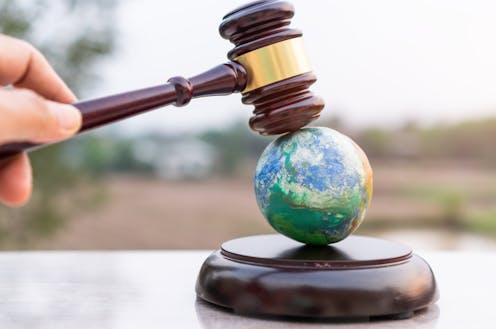
There are different environmental directives in the European Union that member states must comply with. But they do not always do so. Sometimes states fail to take adequate measures to, for example, protect vulnerable ecosystems and species or prevent pollution.
So what happens then? Can the EU impose a fine?
The role of the Court of Justice
The Court of Justice is the organ that guarantees respect for the European Union laws, and has the power to prosecute non-compliance with European environmental law.
Different types of actions may be brought before this court. Among them, the infringement action evaluates if member states’ actions and omissions conform with European Union law.
If state is suspected of failing to fulfil an obligation, the European Commission or any member state may refer the matter to the European court for assessment. A preliminary procedure must be carried out before the commission. In this procedure, the state is asked about its position and information is sought on whether or not there has been a breach.
Non-compliance with environmental standards
The infringement procedure is an essential tool to asses the application of European environmental law by member states. It allows for a dialogue between the respondent state and the European Commission and highlights the difficulties in implementing the environmental standard and the problems of national systems in meeting the obligations undertaken.
Once the case reaches the Court of Justice of the EU, it will declare if there has been a breach of environmental law by carrying out an interpretation of the law. The environmental legislation considered to have been infringed in this type of action is very varied and covers practically all areas of environmental action.
Infringing countries
A review of the cases that the Court of Justice has dealt with includes rulings on non-compliance with regulations on air and water quality, noise, dumping, protection of biodiversity, as well as access to information and environmental justice.
For example, some recent rulings of the Court of Justice in 2022 illustrate the variety of situations it assesses in its judgements.
By judgment of 13 January 2022, Slovakia was found to be in breach of its obligations under the Environmental Noise Assessment and Management Directive. Slovakia hadn’t drawn up action plans for the major roads and railways analysed by the court and hadn’t communicated summaries of these action plans to the commission.
Months later, Slovakia was again found to be in breach of the judgment of 22 June 2022, this time for failure to comply with the Habitats Directive. It hadn’t taken adequate measures to prevent the deterioration of habitats in the Special Protection Areas designated for the conservation of capercaillie.
Recently, there was also a judgement against Bulgaria. In this case, the court found Bulgaria to be in breach of the Marine Strategy Framework Directive. It hadn’t revised the initial assessment of the good environmental status of marine waters it had carried out in accordance with the directive. It also hadn’t communicated to the commission the updates made following these reviews, which is a key element in the rule to promote good environmental status of the marine environment.
In Spain, a finding of non-compliance can be found in the judgement of 24 June 2021. The court declared non-compliance with the Water Directive and the Habitats Directive. The country didn’t take adequate measures in the face of groundwater abstractions to prevent alterations to the habitats of the Doñana protected area .
Are there consequences?
When there is a declaration of non-compliance by the Court of Justice, the state concerned is obliged to take all necessary measures to put an end to the non-compliance. In environmental matters, this implies reviewing all state action in order to ensure that environmental regulations are properly implemented.
It is not always easy to determine whether adequate measures are being taken to ensure the execution of the court’s judgement. Again, communication with the European Commission is crucial to verify that compliance with European environmental law is ensured.
In the event that it is determined that the sentence has not been adequately enforced, the possibility of a new appeal for non-compliance, in this case, with the court’s previous judgement, is foreseen. In other words, the case is referred back to the Court of Justice, which will assess whether adequate measures have been taken to comply with its ruling.
In this second judgement, the court may impose a penalty payment on the state. The amounts set by the court are thus the main deterrent to non-compliance with the court’s rulings and with European environmental law.
The amount set will depend on the importance of the rule infringed, the seriousness and duration of the infringement and the economic situation of the offending state. The methods for calculating these amounts have been established on a state-by-state basis and are reviewed periodically.
The aim is to make countries think twice about breaching European environmental legislation.
Rosa Giles Carnero does not work for, consult, own shares in or receive funding from any company or organisation that would benefit from this article, and has disclosed no relevant affiliations beyond their academic appointment.
This article was originally published on The Conversation. Read the original article.







